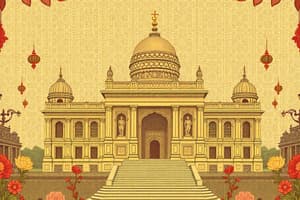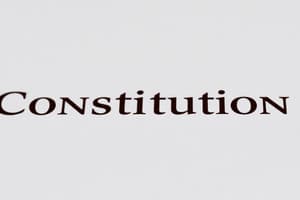Podcast
Questions and Answers
What is the Constitution of India?
What is the Constitution of India?
- A document outlining the rules and principles guiding the nation (correct)
- A rigid document with no scope for amendments
- A manuscript that cannot evolve over time
- A document that only establishes a federal form of government
Who possesses the power to dissolve the Lok Sabha in India?
Who possesses the power to dissolve the Lok Sabha in India?
- President (correct)
- Rajya Sabha
- State Legislative Assemblies
- Prime Minister
What role does the President of India play in the democratic process?
What role does the President of India play in the democratic process?
- Has the ability to enact laws
- Acts as the ceremonial head of state (correct)
- Leads the Council of States
- Holds unlimited executive powers
How are members of the Lok Sabha in India elected?
How are members of the Lok Sabha in India elected?
What type of legislature is the Indian Parliament?
What type of legislature is the Indian Parliament?
Which form of government does India have at the state level?
Which form of government does India have at the state level?
Who has the power to dissolve the Lok Sabha in India?
Who has the power to dissolve the Lok Sabha in India?
Which individual holds the responsibility of advising the President on relevant governmental matters in India?
Which individual holds the responsibility of advising the President on relevant governmental matters in India?
What is the primary role of the Prime Minister in India's government?
What is the primary role of the Prime Minister in India's government?
Which body has most of the actual executive authority in India?
Which body has most of the actual executive authority in India?
What is the purpose of Fundamental Rights in India?
What is the purpose of Fundamental Rights in India?
Under what circumstances can the government limit or suspend Fundamental Rights in India?
Under what circumstances can the government limit or suspend Fundamental Rights in India?
Flashcards are hidden until you start studying
Study Notes
Indian Polity: A Comprehensive Overview
At the heart of India's democratic system lies its Constitution, a document that outlines the rules and principles guiding our nation. This article delves into the fundamental elements of Indian polity, examining the Constitution, Parliament, President, Prime Minister, and the Fundamental Rights that underpin our democratic framework.
Constitution of India
The Constitution of India, enacted on January 26, 1950, is the supreme law of the land, serving as the bedrock of our democracy. It is a flexible, evolving document that has evolved over time through the addition of numerous amendments. The Constitution establishes a federal parliamentary democratic republic with a presidential form of government at the center and a subsidiary, cooperative form of federalism at the state level.
Parliament
The Indian Parliament is a bicameral legislature, comprising the Rajya Sabha (Council of States) and the Lok Sabha (House of the People). Members of the Lok Sabha are directly elected, while members of the Rajya Sabha are elected by the state legislative assemblies and local bodies. The President possesses the power to dissolve the Lok Sabha, but the Rajya Sabha can only be dissolved in specific circumstances.
President of India
The President of India is the ceremonial head of state. While the President holds limited executive powers, they play a crucial role in the democratic process. The President has the power to promulgate ordinances, dissolve the Lok Sabha, and appoint the Prime Minister. However, the President's powers are largely ceremonial, and most actual executive authority rests with the Prime Minister and the Council of Ministers.
Prime Minister
The Prime Minister is the head of government and de facto leader of the ruling political party. The Prime Minister is usually the member of the Lok Sabha who, in the opinion of the President, is most likely to command the confidence of the majority of the members of the Lok Sabha. The Prime Minister selects and appoints the Council of Ministers and holds the responsibility of advising the President on relevant governmental matters.
Fundamental Rights
The Constitution of India guarantees citizens several fundamental rights, including the right to equality, freedom of speech and expression, freedom of religion, and the right to constitutional remedies. These rights are designed to protect the individual from arbitrary state action and to promote social justice and equality. Fundamental rights are not absolute, and the government can in certain cases, limit or suspend these rights in the interest of the sovereignty and integrity of India, public order, or the security of the state.
These five key elements of Indian polity shape the framework in which our nation operates, and as citizens, we have the responsibility to understand and engage with our democratic systems, making informed choices that will help build a better future for our country.
Studying That Suits You
Use AI to generate personalized quizzes and flashcards to suit your learning preferences.




